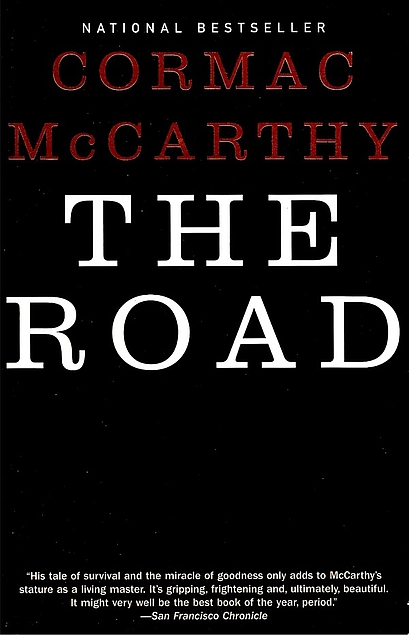“He thought the month was October but he wasnt sure. He hadnt kept a calendar for years …
He lowered the glasses and pulled down the cotton mask from his face.”
This is how Cormac McCarthy’s The Road begins.
It sounds familiar. It sounds relevant — timely; I was afraid, almost, that it would be too timely.
I’d read The Road before, years ago, and it easily became a favorite. Something about McCarthy’s prose is more akin to poetry, and that teetering, razor-edge brilliance of darkness not entirely lost to despair. This is a book whose memory of reading has haunted me through our own ever seeming dystopia; the world darkening through the corners like a vignette. And something beckoned me towards the book again; a glimmer of hope, survival.
This time, I chose the audiobook. Because this time, I was thinking about stories, and what will come next, and what came before: how stories were told without paper, how simple it seems to carry something that weighs nothing more than the air in your lungs. How stories might ask to be told again, in the future (a clock, time, is a great circle).
I’m a reluctant convert to audiobooks — my attention “span” is more of a blip these days, but I ended up listening while laying in bed, right before sleep. I’m sure this was partially responsible for some stressful dreams, but to be honest, they weren’t really any worse than normal.
The other trouble I have with audiobooks — the primary reason for my hesitation — is that I am so very picky about narrators. When I first played the recording of The Road, courtesy of my public library’s hoopla service, I almost backed out.
At first, hearing McCarthy’s words read instead of reading them was a jolt. McCarthy’s style is sparse — he eschews punctuation, dialogue tags, constructs sentences in short, sharp bursts. To hear it spoken out was so different than seeing it on the page; and yet, as I adjusted, listening ended up grounding the prose much more familiar terms. And, to be honest, it became enjoyable. When less engaged from the work of literature, I picked up on new dynamics of the story, new emotions; the narrator Tom Stechschulte, delineated the characters with excellent voices, and added a layer of closeness I don’t think I’d had to the story before. I’d originally enjoyed The Road because the language was gorgeous, and I like McCarthy’s style. I respected the human element, but I hadn’t connected to it. Having an actual person read the story — bring it to life, add dimension, did that for me in a way that hearing the story in the theater of my own mind wasn’t quite able to do. Near the midway point in the book, there’s a scene between the man and his wife — a terrible argument, about the horrors and reality of their future — that I felt was so well acted, and I was caught up in it, breathless.
The center of The Road is the man, and the boy — his son, his only son, and his legacy, and his only reason for living — unnamed and surviving the last gasps of a world ended on the road, trying to make it south, to the coast where the winter might be survived. On the surface, there’s really no reason to survive. Nothing is going to get better; in fact, in a world where cannibalism has become a fore-running dietary option, humanity made macabre ouroboros, it’s safe to say things are only going to get worse. Yet, call it foolish, call it stubbornness, call it humanity — the man and the boy keep going. Still they keep going, down the road.
I’ve always read that as the definition of hope, and now I’ve heard it, too.
McCarthy, Cormac. The Road. Narrated by Tom Stechschulte, Recorded Books, Inc., 2006. Audiobook.



I loved your review. I had to look up ouroboros; I’ve never thought of our time as “an ancient symbol depicting a serpent or dragon eating its own tail”–quite the visual. Then you go on with “This is a book whose memory of reading has haunted me through our own ever seeming dystopia; the world darkening through the corners like a vignette.” I’ve always thought of dystopia as “an imagined state or society”. Now I’m wondering if this current state of world affairs is all real or imagined, I’m leaning towards the side of imagined. If only that were the truth. Thanks for your insight.